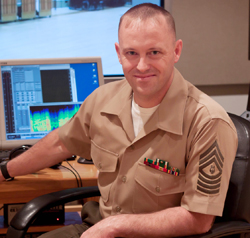
Customs & Courtesies
Now, given Jackson’s security clearance, and the Marines’ reputation as one of the world’s most proficient combat forces, you have to wonder if the job requires any additional skills – such as the ability to take out a heckler armed only with a piece of dental floss, for example?
Jackson chuckles at the suggestion, explaining he was brought into the corps through a process called “lateral entry,” which does not require combat training.
He did have to undergo instruction for the position, but primarily in the customs, courtesies and history of the Marine Corps.
Still, that begs the question: What effects do those customs and courtesies have on his job, and just how “military” are the day-to-day workings of the USMB?
“We’re at the intersection of – probably – the best concert band and the best professional military organization in the world, so both have pervasive impacts,” he says. “We’re part of the hierarchical structure you’ll find in every military, but at the same time, we have to maintain the intimate feeling, the family structure, of a musical organization where we have to treat people informally at times.”
Jackson does refer to the mandate of the USMB as a mission, however, particularly when describing the steep learning curve he faced early on in the job. “One of the challenges was walking into a venue like Boston Symphony Hall with recording equipment and a bag of microphones and trying to figure out how to position mics optimally. It’s tough to hang mics in that room. There aren’t exactly a lot of convenient holes in the ceiling. You have to drop lines in carefully and use fish line to get them exactly where they need to go.”
Over time, he developed his own system, he says. “Through experimentation we came to the conclusion that a near coincident technique, supplemented by some flanking mics and judicious use of spot mics, gave us the best chance of not only capturing ensemble balances, but the stereo field and the location of an instrument on the stage.”
Working at some of the most iconic venues in the nation with the USMB has awoken in Jackson a keen interest in acoustics, an interest that has prompted him to contemplate how best to combine the various skills and interests he’s developed over the past 16 years.
And as he becomes eligible to retire from the USMB in a few years, he is considering pursuing a Masters degree in architectural acoustics, with an eye to transitioning into a career in performing arts facility and acoustical design at some point in the future.
Fulfilling A Mandate
When it comes to live sound, Jackson doesn’t walk into a series of similar venues, with the same gear and the same band night after night. Shows range from full concert band to smaller orchestral, jazz and contemporary country music ensembles, at venues running the gamut from school gymnasiums to Carnegie Hall to the Lincoln Memorial.
Touring is only about 5 percent of the gig and many performances requiring larger systems are outdoor summer shows and, with a few exceptions – like a series of concerts the USMB was invited to play in Switzerland at the invitation of The World Association of Symphonic Bands and Ensembles in 2001 – mostly in the continental U.S.
Put mildly, some shows and some of the musical selections performed are more complex than others, particularly when it comes to fulfilling the USMB’s mandate to introduce new music to audiences. Among them, for example, a symphony including some decidedly non-traditional components: “Shotguns going off in the concert hall and marching bands in the middle of the audience, things like that,” Jackson says.
